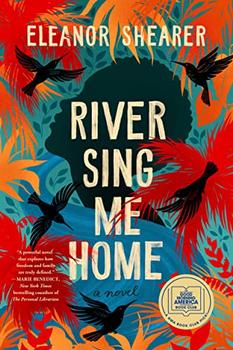Summary | Excerpt | Reading Guide | Reviews | Beyond the Book | Readalikes | Genres & Themes | Author Bio

They all knew what was coming. Some of the slaves even smiled. Rachel was among those who didn't. She was old enough to remember other times when there were whispers about the end of slavery. She would not believe it until she heard it for herself from the master's own mouth.
The master's balding forehead glistened with sweat in the heat. As he brought his horse forward, Rachel caught a glimpse of his wife's face, her lips pressed into a line of seething contempt. It was this sight, more than anything, that weakened Rachel's resolve. She dared to hope.
The master kept his remarks short. He told them that the king had decreed an end to slavery. As of the following day, the new Emancipation Act would come into effect.
They were free.
Some people cried. Others yelled and danced in delight. They were a mass of shouting, sweating bodies, a river bursting its banks. The master and the overseer barked useless orders, unable to be heard over the noise. Eventually, the master rode his horse through the crowd at a gallop, just to get them quiet again. Its hooves kicked one woman's head in, and she died instantly. But she died free.
There was more, the master said. They were no longer slaves, but they were instead his apprentices. By law, they would work for him for six years. They could not leave. When the sun rose, Rachel and all the rest would be going back out to finish the planting. They would tend to the cane until the next harvest, and the harvest after. Six years of cutting and planting and cutting again.
Freedom was just another name for the life they had always lived.
An ugly hiss went through the crowd. The overseer, gun slung over his shoulder, reached to bring it down. A hundred pairs of eyes watched the arc of his hand. The master's horse blew air through its nostrils, its reins pulled taut.
The hiss died, and the crowd was still.
Rachel heard the news of hollow freedom in silence. For years, she had lived in perpetual twilight. Those she loved were long gone. Her life had shrunk to the size of the plantation, the routine of endless toil and the long shadows of what had once been. So, there was sense to it. Freedom was an emptiness that could only be filled with sugarcane.
That night, everything was the same. The press of the ground on her back. The shape of her limbs, thin and knotted with sinew. The musty smell of her hut. Days of labor lay ahead, her life as neatly plowed as the furrows in the field.
In sleep, she dreamed of her mother. Or maybe it was the idea of a mother, an outline of warmth and kindness. She couldn't remember her own mother.
The mother was there in front of her, but somehow Rachel knew that she was also not there. She was somewhere far across the sea. She was fragile, a wisp of smoke. She could not stay long.
The mother spoke a name, and Rachel knew that it was her name-the name she was meant to have before some white man called her Rachel. What the white man gave, he could always take away. But this other name-this was hers. Rachel repeated it. The syllables felt strange in her mouth, but as the thrum of speech vibrated through her, they gave her strength. She was able to stand without stooping. She could feel the pleasant weight of her body, solid and powerful.
The mother stepped back and began to dissolve, one drop at a time, soaking the earth underneath her. When she was gone, the soil glistened a deep, rich red.
Rachel had awoken in pitch darkness-wild, trembling and glistening with sweat-and her body could not be stilled. It moved without her asking it to; it moved on animal instinct alone, crawling out of the hut, unfurling and flinging itself out of Providence and into the night.
In the forest, Rachel asked herself again: Was this freedom? A violent rupture, a body driven to flight, a mind paralyzed with horror as it watched things unfold beyond its control?
Excerpted from River Sing Me Home by Eleanor Shearer. Copyright © 2023 by Eleanor Shearer. All rights reserved. No part of this excerpt may be reproduced or reprinted without permission in writing from the publisher.
Your guide toexceptional books
BookBrowse seeks out and recommends the best in contemporary fiction and nonfiction—books that not only engage and entertain but also deepen our understanding of ourselves and the world around us.